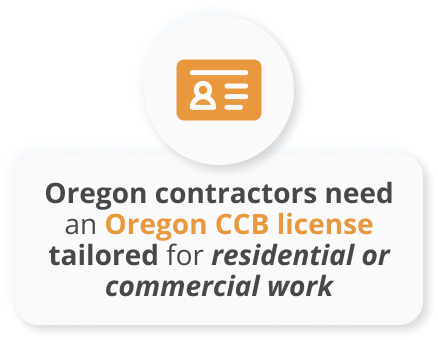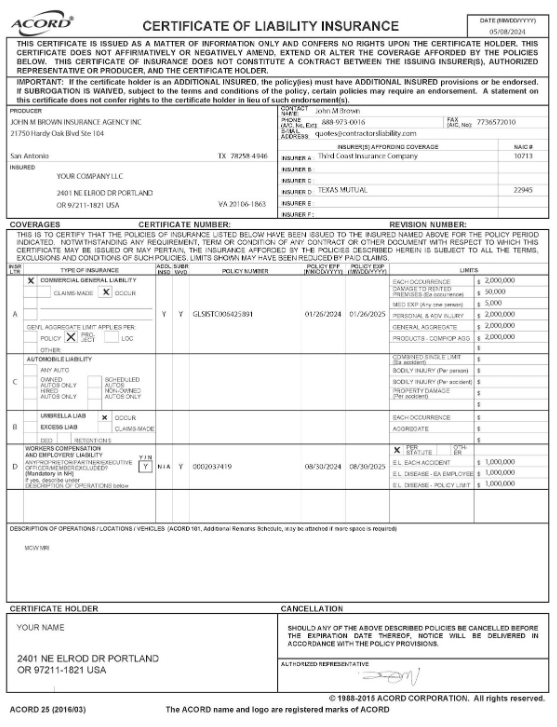Simplify Oregon’s contractor licensing process and elevate your construction business to new heights.
In Oregon, obtaining a contractor’s license is a crucial step in establishing your business within the state’s thriving construction industry. Whether you’re planning to work on residential, commercial, or specialty projects, having the appropriate Oregon contractor’s license ensures compliance with state regulations, enhances your professional credibility, and protects your business from legal and financial risks.
State Overview: General Licensing Requirements
To legally operate as a contractor in Oregon, you must obtain a contractor license from the Oregon Construction Contractors Board (CCB). The CCB oversees licensing for both residential and commercial contractors, with specific endorsements depending on the type of work you plan to undertake.

Key eligibility requirements include:
- Being at least 18 years old.
- Establishing a business structure (e.g., sole proprietorship, LLC, corporation).
- Completing a 16-hour pre-license training course.
- Passing the CCB exam.
- Obtaining the necessary insurance and surety bonds.
The Guide to Becoming a Licensed Contractor provided by the CCB offers a detailed roadmap to help you through the licensing process.
Local Jurisdiction Differences
While the CCB provides statewide licensing, certain cities and counties in Oregon may impose additional requirements:
- Portland: Contractors in Portland must comply with local zoning laws, environmental regulations, and may need additional permits from the City of Portland Bureau of Development Services.
- Eugene: The City of Eugene Permit and Information Center requires contractors to adhere to specific local standards, especially for larger projects.
- Salem: The City of Salem Community Development Department may have additional fees or inspection requirements.
Understanding and complying with these local regulations is vital to ensure that you operate legally and avoid potential fines or project delays.
Step-by-Step Oregon Contractor’s License Application Process

Determine the Appropriate License and Endorsement
- Decide whether you need a residential, commercial, or dual endorsement based on the scope of your work.

Complete Pre-License Training and Examination
- Enroll in a 16-hour pre-license training course approved by the CCB, followed by the CCB Exam, which costs $60 and is paid directly to the exam provider.

Submit Your Application
- After passing the exam, submit your completed Oregon contractor’s license application to the CCB, including proof of insurance, a surety bond, and the license application fee of $325.

Obtain Required Insurance and Bonds
- You must secure general liability insurance and, depending on your endorsement, a surety bond. The bond amounts vary, with residential general contractors needing a $25,000 bond and commercial contractors needing up to $80,000.

Pay Licensing Fees
- License Initial application fee: $325
- License endorsement change: $20
- Renewal every two years: $325
- License inactivation reactivation: $20
General Liability Insurance and Bonding Requirements
Maintaining your contractor’s license in Oregon involves securing the right insurance and bonding. These requirements protect your business and clients and vary based on the type of license and work you do.
General Liability Insurance
General liability insurance covers your business against claims of property damage, bodily injury, and personal injury during your work. The required coverage depends on your license type:
- Residential General Contractors: Need at least $500,000 per occurrence.
- Commercial General Contractors: Require $1 million to $2 million per occurrence due to the larger scale of commercial projects.
- Specialty Contractors: Coverage typically ranges from $100,000 to $500,000, depending on the trade.
This insurance is crucial for protecting your business from unexpected costs related to legal claims.
Surety Bond
A surety bond acts as a financial guarantee that you will meet your contractual obligations. If you fail to do so, the bond compensates the affected parties.
- Residential General Contractors: Must have a $25,000 bond.
- Commercial General Contractors: Bonds range from $25,000 to $80,000.
- Specialty Contractors: Bond amounts vary but often start at $10,000.
The bond cost is a small percentage of the bond amount, based on your credit history.
Workers’ Compensation Insurance
If you have employees, workers’ compensation insurance is mandatory. It covers medical expenses and lost wages for employees injured on the job.
- Who Needs It: All contractors with employees must have this insurance.
- Exemptions: Sole proprietors without employees may be exempt.
This insurance not only protects your employees but also shields your business from legal claims related to workplace injuries.
Key Points
- Combined Policies: Consider a combined policy for liability, workers’ comp, and other coverage to simplify management and potentially save on costs.
- Stay Compliant: Keep your insurance and bonds current to avoid penalties and ensure your license remains valid.

Residential Specialty Contractor Licensing
In Oregon, specialty trades such as electrical, plumbing, and HVAC work require additional licensing, managed by the Oregon Building Codes Division (BCD). As a home services contractor, these trades involve more stringent requirements due to the technical and safety-critical nature of the work.

Electricians
- Requirements: Electricians must pass state exams covering the National Electrical Code and Oregon-specific regulations. Several years of apprenticeship or on-the-job experience are required.
- Examinations: The licensing exam tests electrical systems knowledge and safety procedures. Continuous education is necessary for license renewal.

Plumbers
- Requirements: Plumbers must also be licensed by the BCD, with experience gained through apprenticeships. The state exam focuses on plumbing systems and Oregon codes.
- Examinations: The exam covers installation, maintenance, and safety practices. Continuing education is required for maintaining the license.

HVAC Contractors
- Requirements: HVAC contractors need a license that involves passing exams on HVAC systems, environmental regulations, and state codes.
- Examinations: The exams cover system design, installation, and energy efficiency. Continuing education is required for license renewal.
Other Specialties
- Lead-Based Paint Contractors: Must obtain a special license for working on pre-1978 buildings, including completing a certified training course.
- Home Inspector Services Contractor: Must be certified and licensed, with required training and an exam that covers residential safety and code compliance.
Specialty certification fees include:
- Home Energy Assessor (HEA) Certification: $100 application fee, $100 annual renewal.
- Home Inspector (OCHI) Certification: $150 application fee, $150 renewal every two years.
- Lead-Based Paint Application: $50, with an annual renewal of $50.
All specialty contractors must complete ongoing education to renew their licenses every two years, ensuring they stay current with the latest standards and practices. These rigorous requirements help ensure safety and quality in Oregon’s construction industry.
Frequently Asked Questions (FAQ)
These are common questions about General Contractor License in Oregon.
You need to complete pre-license training, pass the CCB exam, secure liability insurance, and obtain a surety bond.
Yes, Oregon requires specific licenses for trades like electrical, plumbing, and HVAC, with additional exams and certifications.
Yes, cities like Portland and Eugene may have additional building codes and permit requirements.
Oregon contractor licenses must be renewed every two years, along with maintaining required insurance and bonds.
You need general liability insurance and workers’ compensation if you have employees. A surety bond is also required.

